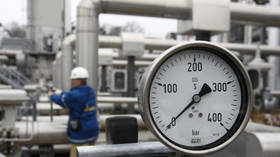Europe’s gas reserves sink to record low

Gas reserves in Europe nosedived to historically low levels this month. According to data by Gas Infrastructure Europe, consumption from storage facilities this January is one third more than the average for the previous five years.
Experts have been raising concerns about the risk of full supply disruption to the EU if tensions between Moscow and Kiev escalate. The European Union receives roughly 40% of its gas via Russian pipelines, several of which run through Ukraine.
Statistics showed that storage facilities were 39.65% full of gas as of January 27. This is the first time that inventories dropped below the 40% mark. The level is 15.6 percentage points below the five-year average.
Typically, Europe’s gas inventories don’t fall even to half until about early-to-mid February. During some mild winters, the inventories don’t sink below midpoint until early March.
This month, the weather was very mild in Europe, but stockholders decided to use reserves to protect against high prices. In many contracts with suppliers, an exchange index “for a month ahead” is used, and now the price of its execution is at an all-time high. On average, gas was traded at $1,310 per thousand cubic meters last month at the TTF hub, with a maximum value of up to $2,138. Under such conditions, buying gas on the spot market at $976 per thousand cubic meters on average looks like a good solution, experts say.
The defensive behavior of importers has also seriously reduced the physical import of gas to Europe. In the first half of January, Gazprom's exports to non-CIS countries fell by 40%. However, analysts note that export volumes may change as early as February as prices stabilize.
According to the experts, the arrival of liquefied natural gas (LNG) cargos in Europe has alleviated the energy crunch. Last week, Europe’s gas transportation system received approximately 434 million cubic meters, a record for that date.
For more stories on economy & finance visit RT's business section












